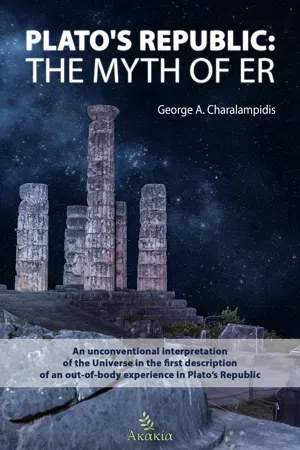![]()
Chapter 1
THE SECRET IDENTITY OF ER
Ἀλλ᾽ οὐ μέντοι σοι, ἦν δ᾽ ἐγώ, Ἀλκίνου γε ἀπόλογον ἐρῶ, ἀλλ᾽ ἀλκίμου μὲν ἀνδρός, Ἠρὸς τοῦ Ἀρμενίου, τὸ γένος Παμφύλου: ὅς ποτε ἐν πολέμῳ τελευτήσας, ἀναιρεθέντων δεκαταίων τῶν νεκρῶν ἤδη διεφθαρμένων, ὑγιὴς μὲν ἀνῃρέθη, κομισθεὶς δ᾽ οἴκαδε μέλλων θάπτεσθαι δωδεκαταῖος ἐπὶ τῇ πυρᾷ κείμενος ἀνεβίω, ἀναβιοὺς δ᾽ ἔλεγεν ἃ ἐκεῖ ἴδοι.
Ἀλλ᾽ οὐ μέντοι σοι, ἦν δ᾽ ἐγώ, Ἀλκίνου γε ἀπόλογον ἐρῶ, ἀλλ᾽ ἀλκίμου μὲν ἀνδρός…
… After all this, Socrates said, I would like to relate the life of a person who doesn’t have the characteristics of Alcinous, but those of a bold man;…
… Ἠρὸς τοῦ Ἀρμενίου, τὸ γένος Παμφύλου...
… this is the case of Er, an Armenian who was a descendant of Pamphylus.
We notice that Plato chooses to open the mystic tale or “myth of Er” by using a wordplay or pun: he juxtaposes the Greek words Alkinou = “of Alcinous” and Alkimou = “of a bold and powerful”; two words that sound almost the same, since they differ by only one letter.
...ὅς ποτε ἐν πολέμῳ τελευτήσας, …
This man, after he was killed in a war,…
… ἀναιρεθέντων δεκαταίων τῶν νεκρῶν ἤδη διεφθαρμένων, …
and after the corpses were taken up on the tenth day already decayed,…
… ὑγιὴς μὲν ἀνῃρέθη, …
he (his body) was found and taken up intact.
… κομισθεὶς δ᾽ οἴκαδε μέλλων θάπτεσθαι δωδεκαταῖος ἐπὶ τῇ πυρᾷ κείμενος ἀνεβίω, …
And when, on the twelfth day, his body was carried to his homeland for his funeral, as it lay upon the pyre to be cremated, it revived!
So the myth of Er has to do with the recording of an exceptionally important and rare event, which is directly connected to metaphysics!
It describes the travel taken by the soul of a man who, while he was apparently dead, his body was preserved totally uncorrupted for 12 whole days, after which he became alive again, returning to the normal state he was before his death.
To begin, then, our analysis of the ancient text, we must understand that the narration that will follow describes a situation nowadays known as an out-of-body experience (OBE), the mechanism of which is totally unknown.
This is the point where the great interest of this text lies, because the story Plato is about to narrate in every detail concerns the wandering of the soul of Er in an invisible world, during the twelve days it had been separated from its body.
Hence, we realize that this is definitely a mystical and occult text, which will reveal to us the function of the invisible world. However, in order to be able to understand and of course to make use of this function to the extent this is possible to us, we should acquire the necessary knowledge.
… ἀναβιοὺς δ᾽ ἔλεγεν ἃ ἐκεῖ ἴδοι.
And after coming to life he started to relate what one would imagine he had experienced where he was as a dead person.
The word ekei (“where he was”) can be held to refer to the underworld, the realm of Hades. It should be thus realized that the meaning of the description that will follow is unique in Plato’s dialogues and, of course, invaluable.
Each reader is about to become a witness of this totally unknown mystical procedure of the wandering of our souls in their after-death state; a procedure that will be described in its entirety and will offer to us the possibility to better understand the way in which we should handle our life for as long as we are “incarnated” according to the beliefs Plato apparently adopts in the “Myth of Er”.
There is probably no other text in the whole Greek literature so clearly and illuminatingly supportive of the existence and metaphysical “function” of this invisible world, which in Plato is connected with the World of Ideas. This is perhaps the reason the author chooses to present it under the safe veil of a “myth”.
Therefore, there is the need to employ all our forces in order to penetrate into the deepest layers of Platonic philosophy and to understand his views on the way the human soul exists after death.
Let us start from the fact that the ancient text begins with a wordplay. Two words that differ by only one letter are used: the name of ALKINOU is juxtaposed to the property of ALKIMOU. Let us try to enter the logic of this pun and to analyze the hidden meanings it contains.
Alcinous (Alkinous) is the well-known hero of Homer, the king of the Phaiacians; as the etymology of his Greek name implies, he is presumably the one who possesses a powerful and evolved mind, as an analogy with a strong body (alke = corporal strength, also the strength of the soul, bravery, courage; nous = mind). Similarly, Alkimos corresponds to the main characteristic of Er, the bold, powerful, healthy and evolved body, will and soul.
Hence, what is declared to us right from the start is that in the following story we will not have to do with persons that possess an evolved mind, but rather with persons that possess an evolved soul and will, for obviously this case is of considerably more interest.
We should know that the topic of the conquest of arete (virtue) is a celebrated occupation of philosophers. Arete, however, is an extremely complex and multifaceted notion, which would require a whole treatise by itself (and many such treatises have been written…) to be analyzed. Here it is sufficient to remind that Aristotle in his work Nicomachean Ethics sets two fundamental categories of virtues:
The intellectual virtues concern the proper function of the mind of a person while on the other hand the moral virtues have to do with the proper function of his or her soul.
So in the particular case presented by Plato, Alcinous is the person who employs only the virtues of nous, the intellectual virtues, while on the other side the alkimos Er is the person who appears as an integrated entity-personality, because in addition he employs also the moral virtues.
After these elucidations, we can better comprehend this wordplay of Plato. We know that Alcinous the king was the son of Nausithous and son or grandson of Periboea. From his father’s side, Alcinous was grandson of Poseidon, the god of sea, while from his mother’s side he was the great grandchild of Eurymedon, the king of the Giants.
Homer tells us that the people of Alcinous, the Phaiacians, were well-known for their capabilities as a seafaring nation (nausiklytoi) and for this reason they were the beloved people of Poseidon, being called “relatives of god”. Initially, they lived in the remote region of Hypereia, near the edge of the world. When their king was Nausithous, the father of Alcinous, they were forced to migrate by the Cyclopes to the island of Scheria, which was renamed “the Island of the Phaiacians” or Phaeacia. The most impressive piece of information about the Phaiacians mentioned by Homer is about their remarkable ships, which were endowed by Poseidon with almost miraculous capabilities: Unlike the common ships of that age, they had no rudders, nor oars, and they could traverse the sea as if they had wings, while they could understand the human thoughts (Odyssey, Book VIII, 555-563).
By correlating these elements from Greek mythology with what the Greek language can reveal, we could extend Plato’s pun to Homer: the genitive case PHAIAKON (= of the Phaiacians) could be imaginatively taken as a composite, from the words “phaia” and “akon”. The first word, phaia, readily connects us to the term phaia ousia, the grey matter of the brain, which contains most of the brain’s cell bodies, pointing to the strong mental abilities of the Phaiacians. However, the second word, akon, which means lack of will (lit. “without his will”, unwillingly), reveals that these strong mental abilities are not necessarily followed by a strong decision-making ability. Because mental abilities have to do mostly with the capacity to discover new things or to invent advanced new technology, or at a lower level to perform tasks that nowadays are done by computers; while in order to make important decisions one has often to employ his or her free will, an exclusively human function.
Summarizing the above in the context of the Platonic text, we could conclude that Alcinous and the strong mind have to do with the function of the brain, while the alkimos Er and free will have to do with the function of a healthy and evolved soul.
In other words, according to the Homeric description, the Phaiacians possessed the equivalent of an advanced technology, as we would say nowadays. However, it seems that this technology did not offer to them the powers necessary to avoid their fleeing from their country, Hypereia. The word hy...

